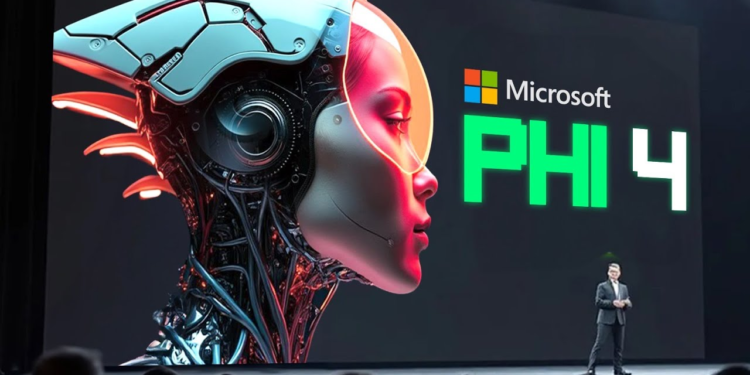The Phi 4 AI model, unveiled by Microsoft, marks a groundbreaking advancement in artificial intelligence, touted as their most powerful offering yet. With unrivaled AI model performance, Phi 4 effectively competes with larger systems while exhibiting exceptional capabilities in complex problem-solving. This innovative model features a robust training foundation, utilizing high-quality web data alongside synthetic math problems, making it ideal for educational applications in diverse fields such as science and coding. Specifically, the Phi 4 reasoning model boasts 14 billion parameters, significantly enhancing its ability to tackle challenging mathematical tasks. As Microsoft continues to push the boundaries of AI, the Phi 4 AI model stands out as a pivotal tool for both developers and learners alike.
Introducing the Phi 4 AI system by Microsoft, this state-of-the-art computational model redefines what’s possible in the realm of artificial intelligence. Celebrated for its excellent performance, the Phi 4 framework integrates advanced reasoning capabilities, setting a new standard for problem-solving techniques across various disciplines. Tailored specifically for educational resources, this AI model utilizes data from web resources and synthetic constructs to deliver tailored solutions in mathematics and other scientific fields. With its impressive architecture—particularly in the Phi 4 reasoning variant, which uses billions of parameters—this innovation promises to transform the educational experience and enhance learning outcomes. Microsoft’s commitment to optimizing AI technology ensures that Phi 4 caters not just to advanced research but also to practical applications accessible to all.
Introducing Microsoft’s Phi 4 AI Model
Microsoft’s Phi 4 AI model represents a significant leap in artificial intelligence technology, designed to rival the performance of larger competitors while maintaining efficiency. This latest offering from Microsoft brings three innovative reasoning models: Phi 4 mini reasoning, Phi 4 reasoning, and Phi 4 reasoning plus, each tailored to tackle complex problem-solving tasks across various domains. With the backing of high-quality web data and synthetic math problems for training, Phi 4 showcases impressive capabilities that enhance learning in educational applications.
The Phi 4 reasoning model, particularly, boasts 14 billion parameters, a testament to its capacity for advanced reasoning and problem-solving. This enhancement propels it forward in fields such as math, science, and coding, which are integral to developing futures-ready skills. The model is set to redefine learning experiences, making it a robust tool for educators and developers aiming to integrate AI solutions into their curriculums.
Frequently Asked Questions
What are the key features of the Phi 4 AI model from Microsoft AI?
The Phi 4 AI model from Microsoft AI is notable for its advanced capabilities in complex problem-solving, featuring three versions: Phi 4 mini reasoning, Phi 4 reasoning, and Phi 4 reasoning plus. These models leverage a mix of synthetic math problems and high-quality web data, making them suitable for a variety of educational applications in math, science, and coding.
How does Phi 4 reasoning enhance AI model performance in educational applications?
Phi 4 reasoning enhances AI model performance by utilizing 14 billion parameters and training on a diverse dataset that includes high-quality web information. This model addresses educational needs effectively, providing robust support for subjects like math, science, and coding while optimizing learning through embedded tutoring.
What distinguishes the Phi 4 mini reasoning model from other Phi 4 models?
The Phi 4 mini reasoning model, with approximately 3.8 billion parameters, is specifically crafted for efficient problem-solving, particularly on lightweight devices. It focuses on educational applications and was trained with 1 million synthetic math problems, making it ideal for resource-limited environments.
How do the Phi 4 reasoning plus and Phi 4 AI model compare in terms of performance?
The Phi 4 reasoning plus model, an enhancement of Microsoft’s previous Phi 4 model, demonstrates performance comparable to other high-capacity models like R1, which contains 671 billion parameters. Internal benchmarks indicate that this model also performs similarly to o3-mini in the OmniMath test, showcasing its advanced reasoning capabilities.
In what ways can educational applications benefit from the Phi 4 AI model?
Educational applications benefit from the Phi 4 AI model through its ability to solve complex problems in subjects like math and science. The model’s reasoning capabilities enable it to support embedded tutoring, enhance learning experiences, and adapt to the needs of resource-constrained devices, making education more accessible.
What techniques does Microsoft AI employ to optimize the performance of the Phi 4 AI model?
Microsoft AI employs techniques such as distillation and reinforcement learning to optimize the performance of the Phi 4 AI model. These strategies help balance the size and computational efficiency, allowing the models to handle complex reasoning tasks effectively while maintaining high functionality.
Where can developers access the Phi 4 AI model for their applications?
Developers can access the Phi 4 AI model, including its various reasoning versions, on the AI development platform Hugging Face. Detailed technical reports accompany the models to assist developers in implementing them into their applications effectively.
| Model Name | Parameters | Training Data | Key Features |
|---|---|---|---|
| Phi 4 mini reasoning | ~3.8 billion | 1 million synthetic math problems | Optimized for educational applications, embedded tutoring on lightweight devices |
| Phi 4 reasoning | 14 billion | High-quality web data, OpenAI’s o3-mini demos | Enhanced capabilities in math, science, and coding tasks |
| Phi 4 reasoning plus | Comparable to R1 (671 billion) | Adapted from the original Phi 4, with performance-based training | Achieves accuracy in reasoning, competes with o3-mini in OmniMath tests |
Summary
Phi 4 AI model marks a significant advancement in artificial intelligence, showcasing Microsoft’s commitment to innovation in machine learning. With its three distinct frameworks – mini, reasoning, and reasoning plus – is designed to solve complex problems efficiently across various fields such as education and science. This launch demonstrates the potential of compact AI systems that do not compromise on performance, effectively catering to resource-limited scenarios while maintaining high functionality. With Phi 4, Microsoft not only meets the increasing demand for capabilities in mathematics and coding but also sets a new benchmark in AI technology.












